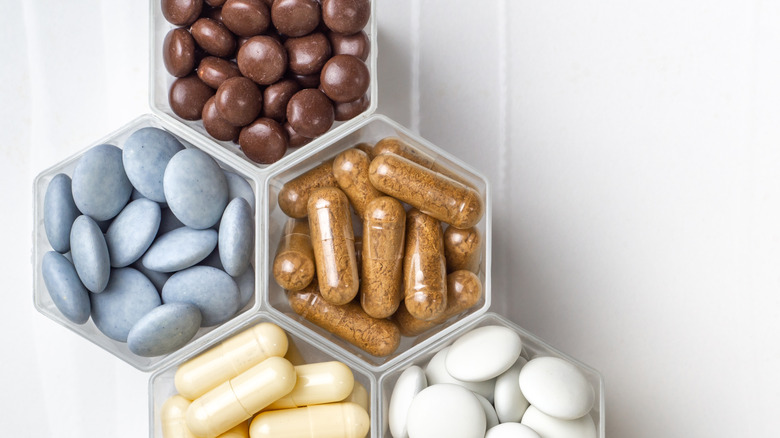The Mineral You Need If You Have Hypothyroidism
A healthy thyroid gland is necessary for many functions in the body. However, many people have thyroid conditions that affect the thyroid gland's ability to do its job. According to Healthline, the most common thyroid dysfunction is hypothyroidism. Hypothyroidism occurs when your thyroid gland does not release enough thyroid hormones into the bloodstream to regulate your body's metabolism.
According to the American Thyroid Association, Hashimoto's thyroiditis, an autoimmune condition, is the most common type of hypothyroidism. As a result of hypothyroidism, you may experience symptoms like weight gain, hair loss, high cholesterol, fatigue, and dry skin (via Mayo Clinic).
Minerals play an important role in every function of the body, including the function of the thyroid. According to Verywell Health, a healthy thyroid gland has the highest concentration of selenium in the body. However, selenium deficiency is a common finding among people diagnosed with hypothyroidism.
According to Healthline, selenium deficiency can lead to thyroid conditions like hypothyroidism. Not only does selenium help the thyroid function normally, but it also protects it. A 2020 article in Cureus journal concluded that selenium plays a vital role in preserving thyroid gland cells and preventing thyroid cell damage in people with Hashimoto's thyroiditis. Since our bodies can't produce minerals like selenium, we must get them through food or supplements (via Harvard T.H. Chan School of Public Health).
What is selenium and how much do I need?
Selenium is one of the essential trace elements your body needs to function properly. Selenium comes from soil, water, and certain foods (via WebMD). According to the Harvard T.H. Chan School of Public Health, the concentration of selenium in the soil used to grow food can impact selenium levels in the foods we eat.
According to the National Institutes of Health, the highest food sources of selenium are in Brazil nuts, seafood like tuna and halibut, and organ meats. Other sources of selenium can be found in foods like bread, eggs, chicken, and beef. Selenium is also available as a dietary supplement if you aren't getting enough in your diet.
Since selenium is an essential trace element, you only need a small amount for a healthy thyroid. How much selenium do you need per day? According to Mayo Clinic, a healthy adult male needs 40 to 70 micrograms of selenium per day, while a healthy adult female only needs 45 to 55 micrograms per day. If you have hypothyroidism and use selenium as a treatment, the dosage needs to be determined by your doctor or dietician because taking too much selenium can cause significant problems with your kidney, nervous system, and heart (via the National Institutes of Health).


